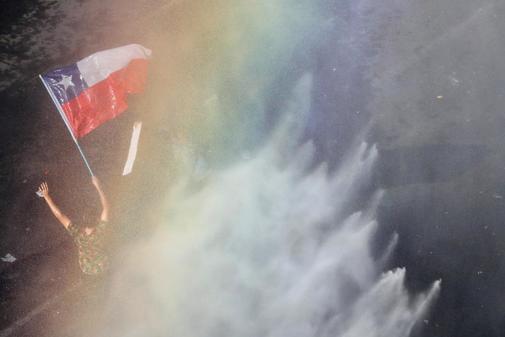- Q&A: The keys to violence in Chile, from idyllic economy to vulnerable society
- Protests.Chile is militarized to stop violence
The death toll in the framework of the protests that are recorded throughout Chile rose to 15 on Tuesday, as reported by the Undersecretary of Interior of Chile, of which eleven occurred in the Metropolitan Region, which includes the capital. According to the authorities, the deaths took place in a context of "burning and looting," although at least one of those killed is a 23-year-old man hit by a military truck.
In the past morning, the police confirmed the finding of a body inside the premises upon arriving in the area after receiving an emergency call to dissolve a mob that was looting it in full curfew in the Chilean capital.
Intense protests were held on Monday for the fourth consecutive day , in a social outbreak that President Sebastián Piñera proposed to deal with "a social agreement . "
In a first declaration of intentions and still resenting the echoes of the strong statement issued on Sunday, when he said that Chile was facing a "war," the right-wing president proposed a "social agreement" on Monday night that would silence the worst social outbreak. in several decades in the South American country.
In his public message, Piñera said he will meet on Tuesday with partisan leaders "both government and opposition," to explore an agreement. Piñera promised to share ideas to improve pensions, lower the price of medicines or improve the quality of greeting care.
In addition, the Government lowered the price of the Santiago metro ticket yesterday to the pre-rise fare that ignited the protests. In this way, on Tuesday, suburban line 1, the only one that will provide services, will open to the public with a price of 800 pesos (just over a dollar, slightly less than one euro) instead of 830 pesos
The fourth day of protests was lived with intensity throughout the country this Monday, when many Chileans tried - with several complications - to resume their normal activities.
"Let the militia leave," the protesters shouted in the central Plaza Italia, in open challenge to the military and police forces that have protected the center of the Chilean capital since Saturday, under a state of emergency and curfew for Third consecutive night.
An awakening with fury
Dancing, caceroleando and clapping loudly every time he flew over a military helicopter, the protesters also chanted: "Ohhh ... Chile woke up; Chile woke up ..." .
"The subway is not important. It is not enough for me to live, personally it affects me the cost of education, the cost of living, I do not even go to the doctor . When I get sick I take herbs," says Claudia Rozas, a student at 22 years.
The riots have left 15 people dead, one of them a 23-year-old man who was hit in the port of Talcahuano (south) by a military truck and whose driver - a Marine - was arrested, the Chilean prosecutor's office reported.
The deaths have mostly occurred due to facility fires amid looting. The Communist Party denounces the death by a police shot of a young Ecuadorian in the city of La Serena (north)
The Minister of Health, Jaime Máñalich, reported on his side that there are 239 civilians injured, eight of them at risk. The head of the Interior portfolio, Andrés Chadwick , said 50 police and soldiers were also injured, while the Prosecutor's Office reported 2,151 detainees throughout Chile . The Institute for Human Rights reported 37 injured by firearms.
Half work day
In an environment of great tension, many employers canceled work days and classes were suspended in virtually all colleges and universities until at least this Tuesday.
The authorities calculated until Monday at 20,000 jobs affected by the destruction and the Santiago Stock Exchange closed its operations with a fall of 4.61%.
If the trigger for the conflict was the increase in the subway fare, as the hours went by the protests echoed other claims in a society that has long since discontented with an economic model whose access to health and education is practically private, with high social inequality, low pensions and rising basic services.
"People are bored, tired, hurt because it is so much," says Solange, a teacher who demonstrated in downtown Santiago.
In downtown Santiago, with a large military and police presence throughout the day and incidents at various points, some stores opened their doors, but most supermarkets and shopping centers remained closed or partially opened.
In the few supermarkets that opened, people made long lines to stock up on groceries. At the gas stations there were also huge lines of vehicles to load fuel.
The violence of the protests had many perplexed , afraid, but also expectant of the changes that may come after the outbreak.
"You could see this coming. The government has done nothing, it was not just the subway that triggered this and ended in vandalism. If the government does not do blunt things, measures to improve salaries, health, pensions .. . ", said Carlos Lucero, 30, a sandwich seller on the central Ahumada promenade.
According to the criteria of The Trust Project
Know more- Chile
- America
- Sebastian Piñera
ChileSebastián Piñera says that Chile "is at war" while there are already 11 dead in the protests
Crisis: Survival Monday in Chile: looking for food and being able to go to work
InternacionalPiñera announces a state of emergency in Chile after a strong explosion of violence due to the rise in subway rates

